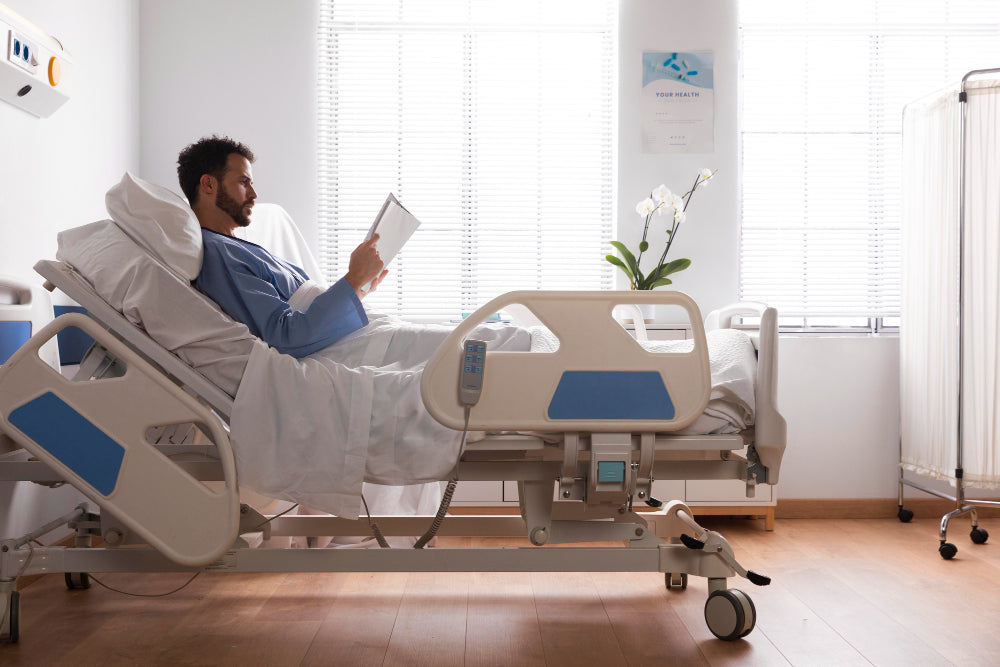Having access to the appropriate equipment might be crucial when it comes to healthcare, particularly for the elderly. A hospital bed is one such necessity. Hospital beds are covered by Medicare, but only if certain requirements are met, such as qualifying diagnosis for hospital bed Medicare. This guide will take you step-by-step through the process of determining what a qualifying diagnosis is and how to make sure that you or a loved one has access to this essential equipment.
What is a Qualifying Diagnosis For Hospital Bed Medicare?
A qualifying diagnosis for hospital bed Medicare denotes a particular medical condition or situation in which the patient's demands cannot be met by a normal bed. Hospital beds and other durable medical equipment (DME) are only covered by Medicare Part B when they are absolutely necessary for treatment. The medical professional must diagnose a patient with a condition that necessitates safety features, adjustable features, or specialized care that a standard bed cannot offer in order to establish the need for a hospital bed.
In order to determine if your disease qualifies as a qualifying diagnosis for hospital bed Medicare, the role of the healthcare provider is critical.
Common Conditions That Qualify:
A number of prevalent diseases frequently satisfy Medicare's requirements for hospital bed coverage. These consist of, but are not restricted to:
- Severe Arthritis: When joint pain or swelling gets greater at night, patients with arthritis may find that the hospital bed's changeable configurations offer much-needed comfort.
- Neurological Disorders: Patients with conditions such as multiple sclerosis, Parkinson's disease, or ALS (amyotrophic lateral sclerosis) may need to sleep in postures that are not suitable for a conventional bed.
- Congestive Heart Failure: A hospital beds for home use may be required for patients with severe heart failure who need to elevate their head and feet to reduce pressure and aid in breathing.
- Respiratory Issues: Patients with chronic obstructive pulmonary disease (COPD) and other respiratory conditions frequently experience breathing difficulties when resting flat. For these people, having a hospital bed that raises the head is crucial.
Not only qualifying diagnosis for hospital bed Medicare, but so do others, as long as the patient's condition is accurately documented by their healthcare provider.
Steps to Qualifying Diagnosis For Hospital Bed Medicare:
- Doctor’s Prescription: Doctor's Prescription: Obtaining a documented prescription from your physician is the first step in using Medicare to pay for a hospital bed. For Medicare hospital bed benefits, the prescription must specify the qualifying diagnosis for hospital bed Medicare benefits.
- Documentation: Make sure your physician has comprehensive records to back up the diagnosis. In order to verify that the hospital beds for home is necessary for your medical care, Medicare needs this documentation
- Choose a Medicare-Approved Supplier: Only hospital beds acquired or rented from providers who accept Medicare assignments are covered by Medicare. This guarantees that there won't be any unforeseen expenses when you receive the device.
- Medicare Part B Enrollment: Verify your enrollment in Part B of Medicare, which provides coverage for durable medical equipment (DME), including DME bed hospital beds. You can't be without Part B.
Different Types of Hospital Beds Covered by Medicare:
Any hospital bed is not covered by Medicare. The bed needs to fulfill certain requirements. The head and feet can be raised on adjustable mattresses, which are typically covered. Typical bed covering types include the following:
- Semi-electric hospital beds: These Independence bed can be adjusted in terms of height and head/foot sections using both manual and electric controls.
- Fully electric hospital beds: Medicare may only pay for a semi-electric form, even though they are frequently more pleasant for the patient. Usually, the patient is responsible for paying the difference in cost between a fully electric and semi-electric bed.
- Specialized beds: If the patient's diagnosis warrants it, low-air-loss or air-fluidized beds, which are frequently used to prevent pressure ulcers, may also be covered.
The particular qualifying diagnosis for hospital bed Medicare will determine the kind of bed that is ordered.
Tips for Getting Approval:
Approval is not always a qualifying diagnosis for hospital bed Medicare, even with a qualifying illness. You can increase your chances by heeding this advice:
- Communicate with your healthcare provider: Talk to your medical professional: Make sure they are aware of your situation and the advantages of having a Passport Hi-Low Adjustable Bed. The more thorough and lucid their justification, the higher the likelihood of your approval.
- Complete all paperwork accurately: Medicare has stringent documentation requirements. Documentation that is erroneous or incomplete may cause coverage denials or delays.
- Follow up with Medicare and suppliers: Participate actively in the process to make sure things go as planned, and don't be afraid to get in touch with Medicare if you run into any problems.
Conclusion:
To guarantee that patients acquire the necessary medical equipment, it is essential to comprehend the qualifying diagnosis for hospital bed Medicare benefits. A homecare hospital beds can make a big difference in comfort and care, whether it's for severe arthritis, heart failure, or a neurological issue. To make the most of Medicare's coverage possibilities, keep thorough records. Collaborate closely with your healthcare provider.
Understanding the qualifying circumstances for these benefits is the first step towards ensuring that you or a loved one has the appropriate help. You may make sure you're prepared to handle this crucial medical service by adhering to the rules. Comprehending the significance of a qualifying diagnosis for hospital bed Medicare benefits. DME of America provide a wide range of medical equipment & supplies for your needs, like Mobility Scooters and much more products like Power Wheelchairs.
FAQs:
What illness is a qualifying diagnosis for hospital bed Medicare benefits?
Conditions such as severe arthritis, respiratory problems, and neurological illnesses needing specialized bed characteristics are among the qualifying diagnoses for Medicare hospital bed benefits.
How does a physician decide whether I am eligible for a hospital bed under Medicare?
After evaluating your health, your doctor will decide whether you require specialist treatment or adaptable placement that a regular bed cannot offer.
Are fully electrified hospital beds covered by Medicare?
In most cases, semi-electric hospital beds are covered by Medicare. Patients may be required to fund a portion of the increased cost difference for a fully electrified home care bed.
Are fully electrified hospital beds covered by Medicare?
In most cases, semi-electric hospital beds are covered by Medicare. Patients may be required to fund a portion of the increased cost difference for fully electrified beds.
What procedures must be followed in order for Medicare to provide a hospital bed?
In addition to a prescription from a physician and comprehensive medical records, you must buy or rent the bed from a provider that has been approved by Medicare.

